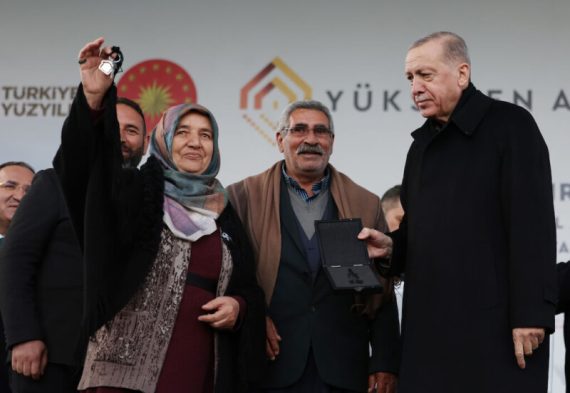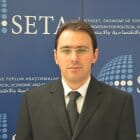T
hroughout its 21 years in power, the AK Party (Justice and Development Party) has spent a lot of time and taken the highest risks to find a peaceful and lasting solution to the “Kurdish question” in Turkey. In this period, almost all options for reaching a lasting solution have been investigated. The AK Party governments have reacted rapidly to the changes in Turkish politics and the region, renewing their tactical and strategic approaches.
Both Turkey’s Kurdish citizens and actors fighting against terrorism have made significant gains as a result. The losers of this process have been the PKK terrorist organization, whose operation capacity within Turkey’s borders has been significantly limited, and the capacity of foreign actors that support this organization and its counterparts under different names.
President Recep Tayyip Erdoğan acknowledged the problem and described his government’s approach with his Diyarbakır speech on August 12, 2005, when he was still prime minister. Erdoğan claimed responsibility for the problem and in the following years, took important steps to find a solution.
Within the boundaries of the rule of law and democracy, Erdoğan took a crucial initiative to resolve the Kurdish question which was renamed the “National Unity and Brotherhood Project” in early 2010. With the initiative, vital legal and political steps were taken to eliminate discrimination against Kurdish citizens arising from their fundamental rights.
The “resolution process” (March 2013-July 2015) was a peace initiative conducted with the representatives of the PKK terrorist organization, namely Abdullah Öcalan, the leader of the organization held in İmralı Prison). Many taboos that had been upheld and proliferated throughout Turkey’s Republican history were broken during this period. However, in the summer of 2015, the PKK ended its last ceasefire and declared a “revolutionary people’s war.”
Following the end of the resolution process, the Turkish state launched a multifaceted process of combating terrorism, and the security approach once again became the dominant perspective. However, this struggle did not reverse the democratic gains of the Kurdish citizens in the past 15 years. In the first place, the terrorist organization’s presence and power came to end. Subsequently, Turkey carried out extensive cross-border operations against the PKK in Syria and Iraq.
Operation Euphrates Shield (August 2016), Operation Olive Branch (January 2018), and Operation Peace Spring (October 2019) dealt significant blows to the PKK’s presence in Syria while the Claw operations significantly limited the presence of the PKK in Iraq. Turkey’s cross-border operations and the dismantling of the PKK’s top leadership with UCAVs have yielded effective results.
Yet, as long as regional powers and Western states continue to support and shield the terrorist organization and its branches in Iraq and Syria, this struggle cannot produce a lasting and decisive result. That said, today, the PKK has largely become an externally supported threat and the effective struggle of the Turkish security forces has blocked it from carrying out terrorist attacks.
How Kurdish politics have changed
In the last two decades, the Kurdish issue in Turkey has undergone a structural transformation. The basic humanitarian demands of Kurdish citizens, including their demands for recognition of their identity and their aspirations, have largely been met and the issue has largely been reduced to terrorism. Geographically, the “Kurdish question” is no longer a problem of eastern and southeastern Anatolia.
The challenges in the eastern provinces of Turkey have largely been resolved and the political extensions of the terrorist organization have shifted their propaganda efforts to large cities such as Istanbul, Ankara, Izmir, Adana, and Mersin. Under the guise of civil society and political party work, these civil extensions try to survive by exploiting institutions that on paper appear legitimate.
Another structural transformation related to the Kurdish issue is the new situation created by the U.S. invasion of Iraq and the civil war in Syria. The instability in Iraq and Syria has provided an avenue for terrorist organizations to organize geographically. Over the last two decades, terrorism has largely become a foreign issue and poses certain constraints on Turkey’s cross-border counterterrorism operations arising from international law and international power competition.
The political wing of the PKK terrorist organization, the HDP, its extensions in civil society, and the sympathy of local and international writers and intellectuals for the terrorist organization focus Kurdish citizens’ attention on the PKK/YPG gains in Syria and Iraq with the primary support of the United States. However, what appears to be an achievement is both extremely fragile and dependent on the power balance between external actors. In fact, the real story of change is the prosperity and reconciliation that emerged with the return of security and peace in Turkey’s eastern and southeastern provinces.
Ideological divergence became visible
A major transformation in the last two decades was the economic, cultural, and ideological diversification of the Kurdish social fabric. The climate of security and stability paved the way for economic development that brought about a process of class stratification and divergence of interest among Kurdish citizens. Kurdish entrepreneurs and investors no longer want to be threatened by or pay tribute to the terrorist organization. Support for public order, law, and the state among Kurdish citizens is growing.
The PKK terrorist organization, which had previously established illegal “courts” in the region, is now seen by the people of the region as a threat to public order. Now, Kurdish families care more about their children getting a better education and living a safer, more peaceful, and prosperous life. On the other hand, the PKK concentrates on deceiving and kidnapping children from poor, uneducated families. The struggle of the Diyarbakır Mothers, in this regard, narrows the terrorist group’s organizational capacity. Ideological divisions within Kurdish society have become increasingly visible.
Recommended
The CHP-HDP collaboration
With Kemal Kılıçdaroğlu becoming the Republican People’s Party (CHP) chairman, the Peoples’ Democratic Party (HDP) and the CHP have been experiencing a rapprochement. Their collaboration, which first showed its impact in the 2018 local elections, has become more deeply rooted over time. HDP supporters have secured employment in metropolitan municipalities run by CHP mayors and have established spheres of influence in various administrative units. This collaboration resulted in the HDP’s decision not to field a presidential candidate in the May 14, 2023 presidential and parliamentary elections in support of the Nation’s Alliance.
The CHP-HDP relationship has transformed the social bases of both parties and brought them closer to each other. However, this collaboration has also brewed opponents in both parties’ grass roots. The shaping of Kurdish politics through the language of secular, leftist, and ethnic nationalism now brings new alternatives to the agenda. As the PKK’s leverage and capacity diminish, Islamist, liberal, and conservative approaches will seek to find more space in the Kurdish political sphere. The process of Kurdish politics becoming polyphonic and multi-ideological has already begun, and this reckoning will gain momentum in the coming period.
The system of alliances emerging with the presidential system in Turkey will further diversify Kurdish political actors in the near future. This process could help free Kurdish politics from the yoke of the HDP and the PKK. Cross-cutting and intersecting relationships and alliances between different political actors could soften the language of politics, but could also pave the way for polarization. All these transformations will breathe new life into Kurdish politics and the AK Party’s Kurdish politics.
The recent electoral consensus reached between the People’s Alliance and the HÜDA PAR (Free Cause Party), which is an Islamic Kurdish party, is an excellent indicator of this. This relationship is likely to expand to other Kurdish political and social actors. This expansion will constrict the PKK’s area of domination and its political wing in the region, the HDP.
Climate of peace and changing priorities in the region
The new climate of peace that emerged with the establishment of security in the Kurdish region of Turkey has also changed the priorities of the region’s people. A strong infrastructure and reconstruction effort is underway in the cities of the region, particularly in Diyarbakır. Education, health, and infrastructure in the region are developing rapidly. Almost every city has a modern airport. The resources previously transferred from Turkey’s central budget to the fight against terrorism and the resources transferred by HDP municipalities to the PKK are now being spent to improve the living conditions of the region’s people.
These efforts not only reduced outward migration, but also transformed these cities once again into centers of attraction. Cities such as Diyarbakır, Van, Urfa, and Mardin have become centers of attraction for local and foreign tourists. Cities such as Hakkari, Siirt, Şırnak, and Batman are also rapidly changing. The arrival of new, large investments will accelerate as the climate of stability is understood to be lasting. The private sector will take over the initiative from the Turkish state in this regard.
While this change is appreciated by the locals, the PKK and its political and civil society extensions are still spreading the narrative that this change is a result of their own struggle. Unfortunately, we have to recognize that this propaganda has found a partial response and is still very effective in the region.
However, members of the PKK are no longer able to extort shopkeepers, businessmen, and locals as they wish. Citizens walking in the streets do not feel unease under the shadow of dark forces. Terrorists who have remained in the countryside, now numbering in the tens, no longer dare to come out of hiding due to the effectiveness of UAVs and UCAVs.
Kurdish citizens themselves will end the “Kurdish question” which has been ongoing for more than forty years in Turkey. This time, however, the yoke they need to remove is no longer state pressure, but the pressure of the PKK terrorist organization and its extensions, which are backed by imperialist actors. This test will be very different from the previous ones: now the Turkish state has created a security climate in which they can wage this struggle and the environment is ripe for democratic mobilization.
Disrupting this climate and plunging it back into chaos would be to the detriment of the people of the Kurdish region. The terrorist barons, who are on their last leg, will, if they can survive, start holding Kurdish citizens to account for their lack of support. The people of Turkey’s Kurdish region will have to make a choice between security, peace, and prosperity, on the one hand, and giving their sons and daughters to the mountains, their wealth to the terrorist barons, and their votes to the extensions of the terrorist organization.





